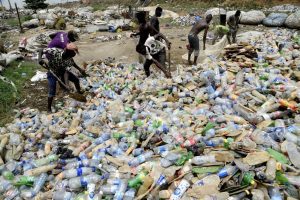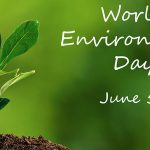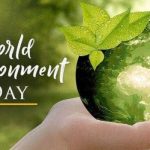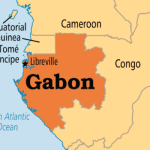It’s World Environment Day, a day to inspire action to protect our planet from climate change and raise awareness to the ongoing negative effects of climate change and global warming.
This year’s theme is all about Ecosystem Restoration #BeatPlasticPollution
Each year, 400 million tonnes of plastic is produced and 40% of that is single-use – plastic only used once before it’s thrown away – and less than 10% of that is recycled.
World Environment Day is organised by the United Nations, a worldwide organisation, that brings countries together to talk about, and try to agree on, world issues.
The day focuses on environmental action and has been celebrated every year on 5 June since 1974.
The aim is to ask governments, businesses, celebrities and citizens to focus their efforts on an important environmental issue and what they can do to be more green and sustainable.
Every World Environment Day is hosted by a different country, in which official celebrations take place. This year’s host is Côte d’Ivoire in partnership with the Netherlands.

The problem with plastic is that most of it isn’t biodegradable.
Around 40% of plastic produced each year is single use, meaning it can’t really be used again. Single-use plastic are things like crisp packets, plastic carrier bags or plastic drinks bottles.
Millions of tonnes of plastic enters the world’s oceans each year and most of that escapes from land.
Tiny bits of plastic, called microplastics, have also been found in things like the food we eat and soil in the ground and even in the air we breathe.
In March 2022, nearly 200 UN countries agreed to start negotiations on an international plan on how to deal with plastic waste.
World leaders have until 2024 to agree the plastic pollution treaty – setting rules on how plastic is made, used and thrown away – and how the treaty is paid for.
The UN Environment Programme (Unep) aims to bringing countries together to try to work on issues that affect the planet.
It’s World Environment Day, a day to inspire action to protect our planet from climate change and raise awareness to the ongoing negative effects of climate change and global warming.
This year’s theme is all about Ecosystem Restoration #BeatPlasticPollution
Each year, 400 million tonnes of plastic is produced and 40% of that is single-use – plastic only used once before it’s thrown away – and less than 10% of that is recycled.
World Environment Day is organised by the United Nations, a worldwide organisation, that brings countries together to talk about, and try to agree on, world issues.
The day focuses on environmental action and has been celebrated every year on 5 June since 1974.
The aim is to ask governments, businesses, celebrities and citizens to focus their efforts on an important environmental issue and what they can do to be more green and sustainable.
Every World Environment Day is hosted by a different country, in which official celebrations take place. This year’s host is Côte d’Ivoire in partnership with the Netherlands.

The problem with plastic is that most of it isn’t biodegradable.
Around 40% of plastic produced each year is single use, meaning it can’t really be used again. Single-use plastic are things like crisp packets, plastic carrier bags or plastic drinks bottles.
Millions of tonnes of plastic enters the world’s oceans each year and most of that escapes from land.
Tiny bits of plastic, called microplastics, have also been found in things like the food we eat and soil in the ground and even in the air we breathe.
In March 2022, nearly 200 UN countries agreed to start negotiations on an international plan on how to deal with plastic waste.
World leaders have until 2024 to agree the plastic pollution treaty – setting rules on how plastic is made, used and thrown away – and how the treaty is paid for.
The UN Environment Programme (Unep) aims to bringing countries together to try to work on issues that affect the planet.
It’s World Environment Day, a day to inspire action to protect our planet from climate change and raise awareness to the ongoing negative effects of climate change and global warming.
This year’s theme is all about Ecosystem Restoration #BeatPlasticPollution
Each year, 400 million tonnes of plastic is produced and 40% of that is single-use – plastic only used once before it’s thrown away – and less than 10% of that is recycled.
World Environment Day is organised by the United Nations, a worldwide organisation, that brings countries together to talk about, and try to agree on, world issues.
The day focuses on environmental action and has been celebrated every year on 5 June since 1974.
The aim is to ask governments, businesses, celebrities and citizens to focus their efforts on an important environmental issue and what they can do to be more green and sustainable.
Every World Environment Day is hosted by a different country, in which official celebrations take place. This year’s host is Côte d’Ivoire in partnership with the Netherlands.

The problem with plastic is that most of it isn’t biodegradable.
Around 40% of plastic produced each year is single use, meaning it can’t really be used again. Single-use plastic are things like crisp packets, plastic carrier bags or plastic drinks bottles.
Millions of tonnes of plastic enters the world’s oceans each year and most of that escapes from land.
Tiny bits of plastic, called microplastics, have also been found in things like the food we eat and soil in the ground and even in the air we breathe.
In March 2022, nearly 200 UN countries agreed to start negotiations on an international plan on how to deal with plastic waste.
World leaders have until 2024 to agree the plastic pollution treaty – setting rules on how plastic is made, used and thrown away – and how the treaty is paid for.
The UN Environment Programme (Unep) aims to bringing countries together to try to work on issues that affect the planet.
It’s World Environment Day, a day to inspire action to protect our planet from climate change and raise awareness to the ongoing negative effects of climate change and global warming.
This year’s theme is all about Ecosystem Restoration #BeatPlasticPollution
Each year, 400 million tonnes of plastic is produced and 40% of that is single-use – plastic only used once before it’s thrown away – and less than 10% of that is recycled.
World Environment Day is organised by the United Nations, a worldwide organisation, that brings countries together to talk about, and try to agree on, world issues.
The day focuses on environmental action and has been celebrated every year on 5 June since 1974.
The aim is to ask governments, businesses, celebrities and citizens to focus their efforts on an important environmental issue and what they can do to be more green and sustainable.
Every World Environment Day is hosted by a different country, in which official celebrations take place. This year’s host is Côte d’Ivoire in partnership with the Netherlands.

The problem with plastic is that most of it isn’t biodegradable.
Around 40% of plastic produced each year is single use, meaning it can’t really be used again. Single-use plastic are things like crisp packets, plastic carrier bags or plastic drinks bottles.
Millions of tonnes of plastic enters the world’s oceans each year and most of that escapes from land.
Tiny bits of plastic, called microplastics, have also been found in things like the food we eat and soil in the ground and even in the air we breathe.
In March 2022, nearly 200 UN countries agreed to start negotiations on an international plan on how to deal with plastic waste.
World leaders have until 2024 to agree the plastic pollution treaty – setting rules on how plastic is made, used and thrown away – and how the treaty is paid for.
The UN Environment Programme (Unep) aims to bringing countries together to try to work on issues that affect the planet.
It’s World Environment Day, a day to inspire action to protect our planet from climate change and raise awareness to the ongoing negative effects of climate change and global warming.
This year’s theme is all about Ecosystem Restoration #BeatPlasticPollution
Each year, 400 million tonnes of plastic is produced and 40% of that is single-use – plastic only used once before it’s thrown away – and less than 10% of that is recycled.
World Environment Day is organised by the United Nations, a worldwide organisation, that brings countries together to talk about, and try to agree on, world issues.
The day focuses on environmental action and has been celebrated every year on 5 June since 1974.
The aim is to ask governments, businesses, celebrities and citizens to focus their efforts on an important environmental issue and what they can do to be more green and sustainable.
Every World Environment Day is hosted by a different country, in which official celebrations take place. This year’s host is Côte d’Ivoire in partnership with the Netherlands.

The problem with plastic is that most of it isn’t biodegradable.
Around 40% of plastic produced each year is single use, meaning it can’t really be used again. Single-use plastic are things like crisp packets, plastic carrier bags or plastic drinks bottles.
Millions of tonnes of plastic enters the world’s oceans each year and most of that escapes from land.
Tiny bits of plastic, called microplastics, have also been found in things like the food we eat and soil in the ground and even in the air we breathe.
In March 2022, nearly 200 UN countries agreed to start negotiations on an international plan on how to deal with plastic waste.
World leaders have until 2024 to agree the plastic pollution treaty – setting rules on how plastic is made, used and thrown away – and how the treaty is paid for.
The UN Environment Programme (Unep) aims to bringing countries together to try to work on issues that affect the planet.
It’s World Environment Day, a day to inspire action to protect our planet from climate change and raise awareness to the ongoing negative effects of climate change and global warming.
This year’s theme is all about Ecosystem Restoration #BeatPlasticPollution
Each year, 400 million tonnes of plastic is produced and 40% of that is single-use – plastic only used once before it’s thrown away – and less than 10% of that is recycled.
World Environment Day is organised by the United Nations, a worldwide organisation, that brings countries together to talk about, and try to agree on, world issues.
The day focuses on environmental action and has been celebrated every year on 5 June since 1974.
The aim is to ask governments, businesses, celebrities and citizens to focus their efforts on an important environmental issue and what they can do to be more green and sustainable.
Every World Environment Day is hosted by a different country, in which official celebrations take place. This year’s host is Côte d’Ivoire in partnership with the Netherlands.

The problem with plastic is that most of it isn’t biodegradable.
Around 40% of plastic produced each year is single use, meaning it can’t really be used again. Single-use plastic are things like crisp packets, plastic carrier bags or plastic drinks bottles.
Millions of tonnes of plastic enters the world’s oceans each year and most of that escapes from land.
Tiny bits of plastic, called microplastics, have also been found in things like the food we eat and soil in the ground and even in the air we breathe.
In March 2022, nearly 200 UN countries agreed to start negotiations on an international plan on how to deal with plastic waste.
World leaders have until 2024 to agree the plastic pollution treaty – setting rules on how plastic is made, used and thrown away – and how the treaty is paid for.
The UN Environment Programme (Unep) aims to bringing countries together to try to work on issues that affect the planet.
It’s World Environment Day, a day to inspire action to protect our planet from climate change and raise awareness to the ongoing negative effects of climate change and global warming.
This year’s theme is all about Ecosystem Restoration #BeatPlasticPollution
Each year, 400 million tonnes of plastic is produced and 40% of that is single-use – plastic only used once before it’s thrown away – and less than 10% of that is recycled.
World Environment Day is organised by the United Nations, a worldwide organisation, that brings countries together to talk about, and try to agree on, world issues.
The day focuses on environmental action and has been celebrated every year on 5 June since 1974.
The aim is to ask governments, businesses, celebrities and citizens to focus their efforts on an important environmental issue and what they can do to be more green and sustainable.
Every World Environment Day is hosted by a different country, in which official celebrations take place. This year’s host is Côte d’Ivoire in partnership with the Netherlands.

The problem with plastic is that most of it isn’t biodegradable.
Around 40% of plastic produced each year is single use, meaning it can’t really be used again. Single-use plastic are things like crisp packets, plastic carrier bags or plastic drinks bottles.
Millions of tonnes of plastic enters the world’s oceans each year and most of that escapes from land.
Tiny bits of plastic, called microplastics, have also been found in things like the food we eat and soil in the ground and even in the air we breathe.
In March 2022, nearly 200 UN countries agreed to start negotiations on an international plan on how to deal with plastic waste.
World leaders have until 2024 to agree the plastic pollution treaty – setting rules on how plastic is made, used and thrown away – and how the treaty is paid for.
The UN Environment Programme (Unep) aims to bringing countries together to try to work on issues that affect the planet.
It’s World Environment Day, a day to inspire action to protect our planet from climate change and raise awareness to the ongoing negative effects of climate change and global warming.
This year’s theme is all about Ecosystem Restoration #BeatPlasticPollution
Each year, 400 million tonnes of plastic is produced and 40% of that is single-use – plastic only used once before it’s thrown away – and less than 10% of that is recycled.
World Environment Day is organised by the United Nations, a worldwide organisation, that brings countries together to talk about, and try to agree on, world issues.
The day focuses on environmental action and has been celebrated every year on 5 June since 1974.
The aim is to ask governments, businesses, celebrities and citizens to focus their efforts on an important environmental issue and what they can do to be more green and sustainable.
Every World Environment Day is hosted by a different country, in which official celebrations take place. This year’s host is Côte d’Ivoire in partnership with the Netherlands.

The problem with plastic is that most of it isn’t biodegradable.
Around 40% of plastic produced each year is single use, meaning it can’t really be used again. Single-use plastic are things like crisp packets, plastic carrier bags or plastic drinks bottles.
Millions of tonnes of plastic enters the world’s oceans each year and most of that escapes from land.
Tiny bits of plastic, called microplastics, have also been found in things like the food we eat and soil in the ground and even in the air we breathe.
In March 2022, nearly 200 UN countries agreed to start negotiations on an international plan on how to deal with plastic waste.
World leaders have until 2024 to agree the plastic pollution treaty – setting rules on how plastic is made, used and thrown away – and how the treaty is paid for.
The UN Environment Programme (Unep) aims to bringing countries together to try to work on issues that affect the planet.














